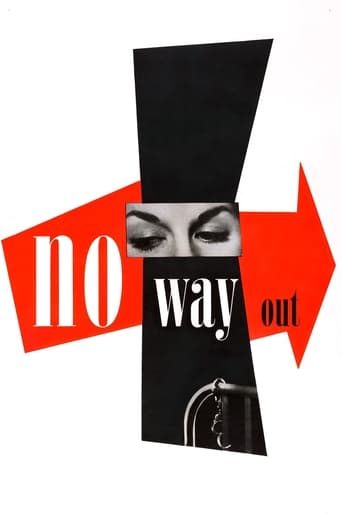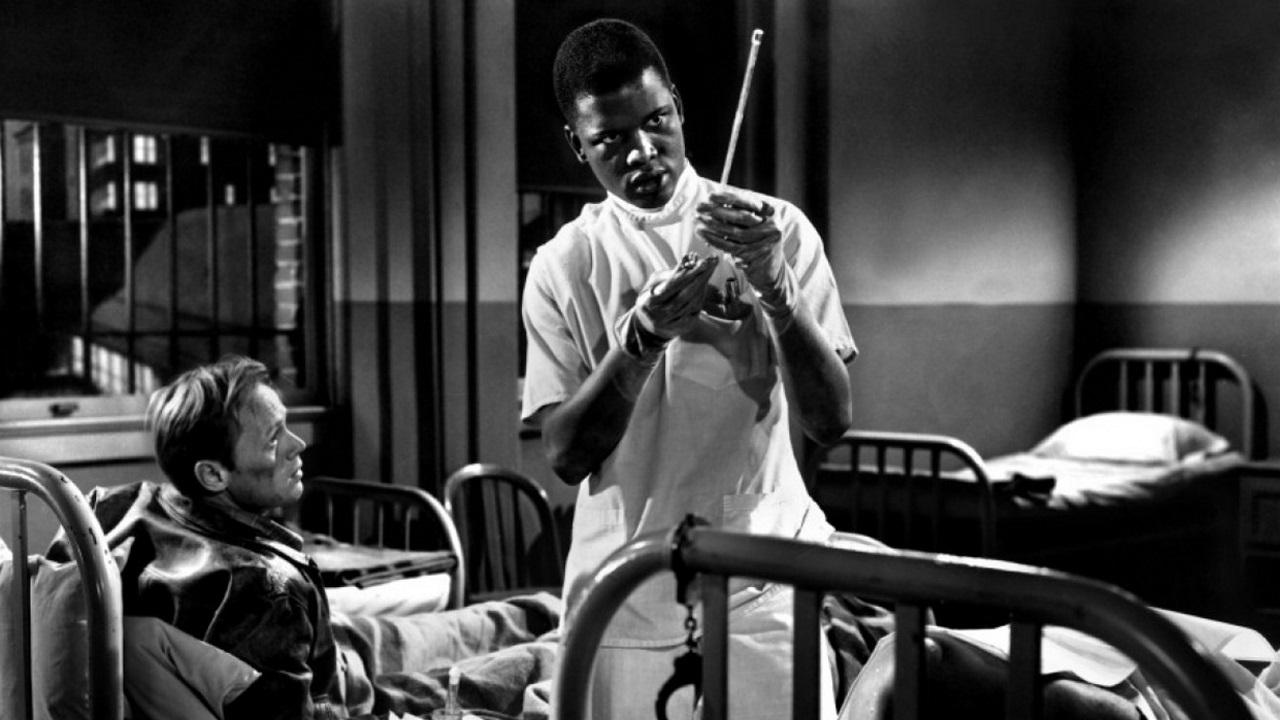pocomarc
A cartoonish movie by left winger Mankiewicz.He lays it on so thick the movie becomes a joke at many points.This lame attempt at a movie comes across like a fifth rate stage play.The dialogue is tedious, overlong at several points, especially where one character talks too long without any relief in the form of response from the character he is talking to.An example is the scene where the head of the hospital goes on and on and on in an early scene in his office with the white head doctor.Widmark gives a cartoonish, cornball performance.Linda Darnell makes the most of the material she is given.
tavm
In continuing to review African-Americans in film in chronological order for Black History Month, we're back in 1950 when a young 22-year-old actor named Sidney Poitier makes his feature film debut in a major motion picture with Richard Widmark as his co-star. Poitier is Dr. Luthur Brooks, who is just starting his practice in the county hospital. Widmark is Ray Biddle, a racist criminal who blames Dr. Brooks for killing his brother in front of him when in reality he was trying to save him. Instead of revealing any more about the plot, I'll just say what great dramatic tension comes whenever these two are together especially when they come to a head at the end. Also adding greatly to the proceedings are Linda Darnell as Ray's brother's former wife who goes back and forth on her loyalties, Stephen McNally as Luthur's superior-Dr. Wharton, Harry Bellaver as George Biddle-Ray's other brother who's deaf and dumb, and Dot Johnson as orderly Lefty Brooks who tells a compelling reason to Poitier why he's attending a riot with his fellow dark-skinned brothers against Ray's fellow white bigots. Even today, No Way Out can fill one with shock at what is said and done here. So on that note, that's a high recommendation. P.S. Among the other people of color in the cast: Mildred Joanne Smith in her only film appearance as Luthur's wife Cora, J. Louis Johnson as an elderly man who also works at the hospital, husband and wife Ossie Davis (in his film debut) and Ruby Dee as brother John and sister Connie Brooks, Maude Simmons as the mother of all three Brooks siblings, and Amanda Randolph as Dr. Wharton's housekeeper Gladys. About the last one, I've now seen this sister of Lillian Randolph-one of the players of my favorite movie, It's a Wonderful Life-in such black-oriented fare as The Black Network, Swing!, and-just several days ago-in Lying Lips not to mention in several eps of "Amos 'n' Andy" as Sappire's mama. And now, for the past few days and hours, I've also seen Dot Johnson and J. Louis Johnson in Reet, Petite, and Gone not to mention Ruby Dee in The Jackie Robinson Story. I've also looked at the list of movies many of them made after this one that I plan to review the rest of this month and am now looking forward to anticipating whatever surprises await when the time comes. It should be interesting, that's for sure!
secondtake
No Way Out (1950)Hard hitting, sometimes shocking, always unflinching view of America's new confrontation with racism in the 1940s. Richard Widmark's character, deplorable racist Ray Biddle, and his performance so raw and impressive (and physical), it reminds you of how easy it was and is for some people to be hateful about race--it's about blindness, really, to what was right in front of him. And that was an black doctor, played by Sidney Poitier in his first film role, setting up a lifetime of roles where he played the symbolic African American that conservative white America could deal with and accept most easily.There are what seem like unavoidable moments where the issue becomes the focus outside of the plot, where it seems to almost start to preach, but amazingly, these are few and brief. One of the miracles of the movie is how fully it confronts urban racism by just showing it happening. It becomes a complete, complex drama by adding what amounts to a kind of film noir crime aspect in the second half. The growing importance of Linda Darnell in the plot gives it human depth, and the white doctor who is Poitier's mentor plays his role with as much subtlety as his saintly position allows.There are a number of moments where you think, no, that's not likely--turns in the story, little details. Key among these is a series of police related gaffes, mainly loose security surrounding two dangerous criminals. Unfortunately, these gaffes end up driving the plot at times. Fortunately, there are compensations, including a full blown race riot, bravely shown with everyone having hate in their eyes, both sides.Director Joe Mankiewicz has always leaned, through these classic Hollywood years, to movies with human depth, and here he takes a chance by taking on a visible "issue" of the time, much as Stanley Kramer did with Guess Who's Coming to Dinner in the 1960s. Even if it boxes in the movie a little as a narrative experience, it's worth it. With the support of brilliant cinematographer Milton Krasner (brilliant) and music by Alfred Newman, and with some fast editing and a whole series of turns to the story, you really can't go all wrong.
ackstasis
Sidney Poitier was one of Hollywood's great trailblazers, probably the first African American to achieve mainstream success. 'No Way Out (1950)' was his debut leading performance, and (despite being billed fourth) he carries the role with incredible charisma, as Luther Brooks, a young doctor who is constantly vilified by white patients harbouring racial prejudices. After a criminal (Harry Bellaver) dies in Dr Brooks' care, his low-life brother Ray Biddle (played by Richard Widmark, who can hurl racial epithets with the best of them) accuses the doctor of murder, and the incident sparks civil unrest across the city.There's a haunting sense of futility about the film. Brooks tries everything possible to prove, both to himself and to Ray Biddle, that his diagnosis and conduct towards his white patient were medically justified. However, even when faced with the direct evidence of an autopsy, his accuser stubbornly maintains Brooks' culpability. The villain here experiences no moral revelation, retaining his racial prejudices even as, in the final moments, Brooks saves the man's life by treating his injuries. An original version of the script reportedly ended with Brooks' murder, a conclusion that would no doubt have left viewers totally and irretrievably gutted. In the finished product, at least there's hope for most.Everyone in this film, it seems, was kicking serious goals in 1950. Widmark also appeared in Kazan's epidemic thriller 'Panic in the Streets (1950)' and Dassin's British noir 'Night and the City (1950),' one of my favourite films. Director Joseph Mankiewicz also directed the Oscar- winning 'All About Eve (1950),' which I like to characterise as a "two- hour cat-fight," and a most entertaining one at that. Throughout his distinguished career, Poitier would go on to appear in various other landmark pictures exploring themes of racial prejudice and tolerance, including 'The Defiant Ones (1958),' 'Guess Who's Coming to Dinner (1967)' and 'In the Heat of the Night (1967)' {the latter of which bears many similarities with this film, replacing Poitier's doctor with a detective}.



 AD
AD





